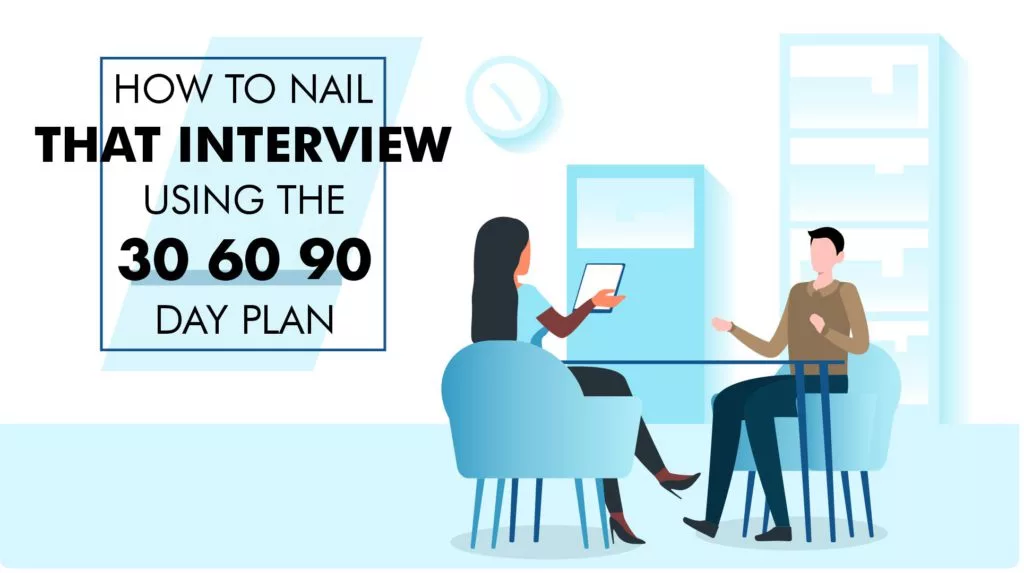“What is Your 30 60 90 Day Plan” Interview Question: How to Answer?
Hiring manager grills you heavily during a job interview in order to discover your qualifications and desires for your new employment. It can be a strеssful moment, but holds paramount importance in one’s career journey. They could query your goals for the preliminary three months of employment. It is important to answer it smartly as it can make or break the interview decision.
Interview is a crucial and nerve-wracking period because of the need to effectively present one’s abilities and personality while also assessing potential employees. The justifications for the interview question “What are your goals for the first 30, 60, and 90 days?” and the steps you might follow to answer it. This article will therefore cover 30-60-90 day plan interview questions to assist you in composing your response.
When does the Hiring Manager ask about Your 30-60-90 Day Plan in the interview?
Thе Hiring Managеr typically asks about your 30-60-90 Day Plan in thе latеr stagеs of thе intеrviеw procеss. It’s oftеn brought up whеn thеy arе considеring you as a sеrious candidatе for thе position, usually in thе second or final intеrviеw rounds. This question assеssеs your preparedness, commitmеnt, and alignmеnt with thе company’s goals and еxpеctations, so it’s important to have a wеll-thought-out plan rеady to discuss at this stagе.
Why does the Hiring Manager Ask 30 60 90 Day Plan Interview Question?
The 30-60-90 day interview questions are very common. Your first three months of employment comprise the first 30, 60, and 90 days. This interview question is frequently used by employers to determine your potential for job mobility.
- New hires learn about their job responsibilities, business procedures, and the company culture during this 30-60-90 day.
- This question can also gauge how well you comprehend the obligations and requirements of the role.
- It reveals the candidate’s ability to formulate a structured plan for the initial months on the job, showing that they have considered the company’s goals and their role in achieving them.
- Crafting and presenting a 30-60-90 day plan demonstrates the employees communication skills, as they need to convey their ideas clearly and concisely.
This interview question might help employers picture your potential position as an employee in their organization. Asking the 30 60 90 day plan interview question helps the hiring managers gain insights of an employee’s readiness, strategic thinking and commitment.
How to Answer the 30-60-90-Day Plan Interview Question?
You can demonstrate to potential employers how you intend to use your knowledge, expertise, or training to contribute to your new position by responding strongly to the interview questions on 30 60 90 plan. You can follow the process listed below to respond to this question during your interview:
- Research for the concerned position
- Keep your goals in mind
- Give illustrations
- Speak with assurance
- Pose a followup query
1.Research for the concerned position
Research the position and company before the interview to assist you in getting ready for your response. To further grasp the primary duties of the role, read the job description or go online for comparable job postings. Speak with someone in a comparable job and inquire about their successful transition. Read articles or a website search to learn more about the company’s business operations and strategic objectives. You can use this information to design your response and convince employers that you are aware of the demands of the position.
2.Keep your goals in mind
Consider the objectives you can reasonably achieve in your first three months while composing your answer to this question. Take a moment to consider the duties or projects you intend to do. Then, list a few objectives you have for the job. Here are some typical objectives you can set for your first 30, 60, and 90 days in a new position. Your objectives may change depending on the position or industry:
- 30 days: You can make goals for yourself within the first 30 days to complete a job- or company-related training, get to know your coworkers and supervisor, research business policies, and grow comfortable in the workplace.
- 60 days: Following your initial 30 days, you may continue your training while getting to know the job better by closely collaborating with your team or supervisor. Finding prospects for your position or department and learning more about the industry may be your objectives for the second month.
- 90 days: During this time, you should concentrate on putting the training you received to use in your new position. Your objectives can include successfully integrating into the company in your new role and forming lasting relationships with your coworkers, boss, or clients.
3.Give illustrations
Answer the question by describing your objectives and how you plan to achieve them during the first 90 days. It’s beneficial to give specific instances where you’ve established and attained professional goals. Give some instances of the work you completed in your first three months in the role if your prior experience relates to the post. If you have little to no experience in the field, talk about specific instances when you took the initiative to learn new duties or abilities and how you overcame obstacles you faced.
Recommended Templates: Leadership Development Roadmap
4.Speak with assurance
Answering this question confidently can help you express your goals and show that you are committed to achieving them. So that the interviewer can comprehend your ambitions for your first three months with the organization, make eye contact with them, and speak calmly.
5.Pose a follow-up query
Asking follow-up questions during an interview might demonstrate to your hiring manager your desire to succeed. Ask whether your response aligns with their expectations for the role after discussing your objectives for the first 90 days. After the interview, when employers often ask if you have any final questions regarding the position, you can also ask questions. Here are some possible questions you can ask regarding your first three months in the new position:
- What objectives do you have for 30, 60, and 90 days for this role?
- How can I succeed in this position during the first three months?
- What kind of training can I anticipate getting during my first three months on the job?
- What are the position’s immediate and long-term objectives?
30 60 90 Day Plan Interview Question Examples
Here are some example answers based on seniority: Executive, Manager (Mid-Senior), and Management position:
Example for Executive Position:
I’ll concentrate on establishing connections with important stakeholders and being familiar with the organization’s high-level plan in the first 30 days. I want to find areas to cut costs and enhance efficiency by day 60. I want to increase employee retention by 15% within the first year, so I will start a new leadership development program in the next 30 days.
Example for Manager Position:
I’ll concentrate on developing trusting relationships with my team and getting to know the projects at hand in the first 30 days. I want to establish certain performance standards for my team by day 60 and improve teamwork. Over the next 30 days, I’ll implement more efficient project management procedures to accelerate team productivity, cut project costs by 15%, and cut project delays by 20%.
ALSO READ: 30 60 90 Day Plan For Managers
Example For Management Position:
My top priority in the first 30 days is to fully integrate into the team and corporate culture. I’ll have one-on-one conversations with each team member to learn about their talents and obstacles. I intend to start making changes depending on the revelations as we move into days 31–60. This involves implementing team-building exercises and performance-tracking tools to improve cooperation and productivity. Days 61 through 90 of the final 30 days (days) will be when I turn my attention to strategic advancements. I’ll promote cross-functional cooperation so that the department’s aims and the company’s goals are compatible. Delivering tangible results is my key objective during this phase; I’m looking for a 15% improvement in team productivity and a 10% decrease in costs.
Here are some example answers based on different roles:
Example for Product Manager:
I will thoroughly examine our product lines, collect client input, and hone our product strategy in the first month. I’ll establish cross-functional product development teams by day 60 and start work on two new features. I aim to provide a beta version of these features within the next 30 days for user testing with the intention of 10% user engagement growth.
Example for Marketing Manager:
Over the first 30 days, I will create a content schedule, thoroughly audit our current marketing initiatives, and evaluate the effectiveness of our marketing platforms. I want to start a focused email marketing campaign by day 60 to increase engagement and conversion rates. My main goal in the remaining 30 days is to boost website traffic by 20% through content marketing and SEO improvements.
Example for Sales Manager:
My top priorities in the first month are understanding our present sales processes, assessing team performance, and establishing personal sales goals. By day 60, I want to use better sales tactics and training to boost the sales conversion rate by 10%. I’ll launch a new lead generation approach in the next 30 days, which should provide a 15% increase in leads and a proportional rise in sales.
ALSO READ: 30 60 90 Day Sales Plan
Example for Project Manager:
I’ll conduct a full project analysis over the first 30 days, establish transparent communication procedures, and develop a comprehensive project timeline. I aim to ensure we’re on schedule and within budget by day 60. To reduce project completion time by 15%, I’ll assess the project over the past 30 days to find areas for improvement and put new modifications into place to streamline operations.
In conclusion, the 30-60-90 day plan interview question is a crucial step in the interview process because it allows you to demonstrate your strategic thinking, comprehension of the position, and dedication to make an effect. Impressing the hiring manager requires you to tailor your response to the position and company.
Being properly prepared for any question can substantially affect how well you represent yourself in the interview. This promotes clarity in your thoughts; setting the stage for success from thе vеry beginning. Create a path way to crack any interview by utilizing the 30-60-90 Day Plan PowerPoint tеmplatеs from SlidеUpLift.
FAQs
-
Can I have feedback on my 30 60 90 day plan during the interview?
Yes, asking for feedback shows your openness to collaboration and improvement.
-
What's the primary purpose of the 30-60-90 Day Plan interview question?
The main purpose is to assess a candidate’s understanding of the role, strategic thinking, and alignment with the company’s goals.
-
How should I align my plan with the company culture?
Research the company culture and values and ensure your plan reflects an understanding and alignment with them.
-
Can I adapt my plan for different positions within the same company?
Yes, you can tailor your plan to suit specific roles, but ensure it remains aligned with the company’s goals and culture.
-
How can I make my plan stand out from other candidates?
Focus on showcasing your unique skills and experiences that make you a valuable addition to the organization. Tailor your plan to demonstrate that value during the interview.
















